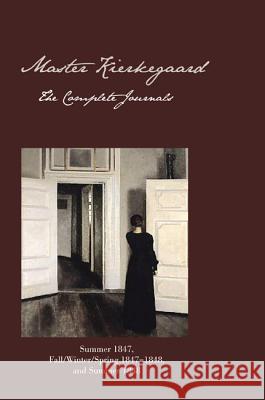Master Kierkegaard: The Complete Journals: Summer 1847, Fall/Winter/Spring 1847-1848, and Summer 1848 » książka
Master Kierkegaard: The Complete Journals: Summer 1847, Fall/Winter/Spring 1847-1848, and Summer 1848
ISBN-13: 9781610972321 / Angielski / Miękka / 2013 / 214 str.
Master Kierkegaard: The Complete Journals: Summer 1847, Fall/Winter/Spring 1847-1848, and Summer 1848
ISBN-13: 9781610972321 / Angielski / Miękka / 2013 / 214 str.
(netto: 95,42 VAT: 5%)
Najniższa cena z 30 dni: 98,83
ok. 16-18 dni roboczych.
Darmowa dostawa!
Description: In this serial work of religious historical fiction, Magda, a "fallen woman" from Berlin turned maidservant in the house of Soren Kierkegaard, seeks the full life that has thus far eluded her. Two journals set in the summer of 1847 record Magda's responses to the Luther Bible, Goethe's Faust, and her elusive yet compelling master, who is simultaneously crafting his Works of Love. Three journals set in the fall, winter, and "people's spring" of 1847 and 1848 reflect Magda's ongoing engagement with secular and sacred writings, her sporadic yet intimate interactions with her master, the precariousness of her position in his household, and the rapidly changing social landscape, at the same time as Kierkegaard begins, revises, or completes several of his most existential and prophetic works. A sixth journal set in the summer of 1848 reveals Magda's final disposition. Is she judged, or is she saved? Endorsements: "Through the changing of the seasons in a year of revolutions, a maidservant reflects on the Bible . . . and the anguish and hope of her master, the Danish philosopher Soren Kierkegaard. Ellen Brown has crafted an understated, heartfelt, and moving meditation on the enigmatic man, religion, the position of women in society, and a life of exile and liberation." --Marshall Brown, Professor of Comparative Literature at the University of Washington, editor of Modern Language Quarterly, and author of The Shape of German Romanticism "Readers of Magda's diary from the summer of 1847 will be delighted with these journals, which continue her life story alongside her continuing reflections on Scripture, literature, and life. Like the first volume, this collection is filled with spiritual insight and wisdom. The life story takes a surprising turn, or was it to be expected? Magda's characterization of Kierkegaard is poetic and convincing." --Adela Yarbro Collins, Buckingham Professor of New Testament Criticism and Interpretation at Yale Divinity School About the Contributor(s): Ellen Brown lives in Connecticut. Her publications prior to Master Kierkegaard include essays on Percy Shelley's Prometheus Unbound and Mary Shelley's Frankenstein."
Description:In this serial work of religious historical fiction, Magda, a "fallen woman" from Berlin turned maidservant in the house of Søren Kierkegaard, seeks the full life that has thus far eluded her. Two journals set in the summer of 1847 record Magdas responses to the Luther Bible, Goethes Faust, and her elusive yet compelling master, who is simultaneously crafting his Works of Love. Three journals set in the fall, winter, and "peoples spring" of 1847 and 1848 reflect Magdas ongoing engagement with secular and sacred writings, her sporadic yet intimate interactions with her master, the precariousness of her position in his household, and the rapidly changing social landscape, at the same time as Kierkegaard begins, revises, or completes several of his most existential and prophetic works. A sixth journal set in the summer of 1848 reveals Magdas final disposition. Is she judged, or is she saved?Endorsements:"Through the changing of the seasons in a year of revolutions, a maidservant reflects on the Bible . . . and the anguish and hope of her master, the Danish philosopher Søren Kierkegaard. Ellen Brown has crafted an understated, heartfelt, and moving meditation on the enigmatic man, religion, the position of women in society, and a life of exile and liberation."--Marshall Brown, Professor of Comparative Literature at the University of Washington, editor of Modern Language Quarterly, and author of The Shape of German Romanticism"Readers of Magdas diary from the summer of 1847 will be delighted with these journals, which continue her life story alongside her continuing reflections on Scripture, literature, and life. Like the first volume, this collection is filled with spiritual insight and wisdom. The life story takes a surprising turn, or was it to be expected? Magdas characterization of Kierkegaard is poetic and convincing."--Adela Yarbro Collins, Buckingham Professor of New Testament Criticism and Interpretation at Yale Divinity SchoolAbout the Contributor(s):Ellen Brown lives in Connecticut. Her publications prior to Master Kierkegaard include essays on Percy Shelleys Prometheus Unbound and Mary Shelleys Frankenstein.











